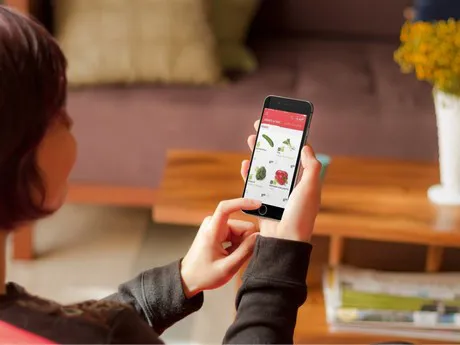For offline shops, fresh produce departments are the showpiece. That’s also true for online supermarket Picnic, according to Mathijs Lak, fresh produce category manager of Picnic. “A good fresh produce department ensures regular orders. In general, fruit and vegetables have a limited shelf life, and consumers therefore regularly need that.” The fresh produce department is therefore an important pillar for Picnic.

The CBS (Statistics Netherlands) recently reported the Dutch are frontrunners in Europe when it comes to buying food online. That’s based on the trust in the supplier. As an unknown retailer, Picnic had to and has to earn and prove that trust. “We can’t show we have good products in a shop. Moreover, consumers can choose the best product from the shelves in shops. Now we have to do that for them, and make sure they get the best product. It’s important to always do that well and to deliver the best quality and the complete order.”
For the success in the field of fresh produce, Picnic also relies on suppliers. “We only buy what has been sold, so when a supplier doesn’t supply good quality or doesn’t have enough stock, there’s a shortage because we won’t be able to deliver the desired quality and amounts to the customer. Customers can order from us until 10 in the evening, and that has to be delivered the next day. That requires flexibility and professionalism from suppliers, and that sometimes takes some getting used to. Larger suppliers are already better at this than smaller ones, but these haven’t been able to gain as much experience in this yet. We strive to buy as close to the source as possible, but bundling is important to us as well, because it all has to be feasible logistically. An efficient buying process has a positive effect on quality and availability for the customer.”
Picnic’s fresh produce department is comparable to the supply of online supermarkets and is further expanded interactively. “We now have an extensive range of all flavour varieties, organic fresh produce and convenience. The customer decides what can be chosen online. We initially started with a fairly standard assortment. However, from the start the app has featured a button that allows customer to let us know they’re missing something, and we respond to that. An example of this is that we added broccolini in addition to broccoli on customer request.”
On the other hand, Picnic also has a push mechanism. “We can ‘turn on’ new introductions and products for one or two DCs and test them very easily for demand and impact. This makes it easy for us to test customer demand and market developments, but in the end, the data has to prove whether the hypothesis is correct. We’re an organisation driven by data, and that helps us enormously to make the right decisions in the field of assortment.”
Picnic supplies in large cities but also in areas with mid-sized cities such as Amersfoort, Arnhem, and soon also Venlo. They don’t have to focus on certain target audiences, but on service and convenience. “Physical shops are in neighbourhoods with certain population compositions, and they adjust their assortments accordingly. All layers of the population shop with us: rich and poor, large families, singles and young people. However, we have seen that we’re over-represented among households. The lowest price and free delivery combined with a very precise delivery is ideal for them. Demand is different for everyone, and due to data analysis we can adjust our supply and logistics accordingly.”
As a purely online supermarket, Picnic can skip a link in the supply chain. The orders are delivered directly from the DC, and are transported under optimally conditioned circumstances. In general, Picnic can therefore supply a fresher product to the customer, and that distinctive characteristic can be seen in the shelf life guarantee. On the website, a logo indicates the minimum shelf life of a product if customers store it in the right circumstances at home. “We supply natural products, you can’t control everything. When products aren’t available or not the right quality, we can remove it from the shop. When we see problems in advance, bananas that are slightly too green for instance, we can send along a notification for the customer. Bananas can still be eaten, but the customer gets them for free, for example. When customers have a complaint, they get a refund. We do ask them to send us a photo if possible, so that we can find out where things went wrong, to improve the process with our partners. In the end, we want to deliver products to our customers as fresh as possible. We’re one step shorter in the supply chain up front, but in the back a lot of improvements are still possible. But other chains have had 80 years of experience, while we’ve only been around for 2.5 years so far. But our new way of working also ensures improvements that hadn’t been seen before,” Mathijs concludes.
More information:
Picnic
Mathijs Lak
trading@teampicinic.nl
www.teampicinic.nl
